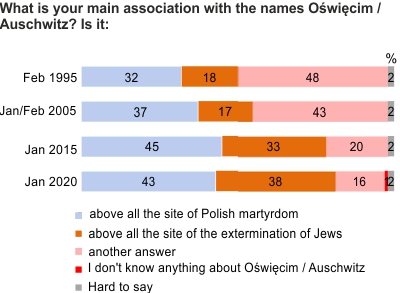| LATESTPUBLICATIONS Polish Public Opinion December 2019
 | Evaluation of the year 2019
|
 | Social reactions to the new government
|
 | Attitudes towards Islam and Muslims
|
 | Alcohol consumption
|
"Opinions and Diagnoses"no 43
Youth 2018
no 44
Contemporary Polish Family
Reports | Foreigners Working in Poland
|
 | Expectations for the New Government of Mateusz Morawiecki
|
 | Perception of Social Structure
|
 | Political Party Preferences in January
|
 | Opinions about Parliament, President and Local Authorities
|
 | Social Moods in January
|
 | Attitude to Government in January
|
 | Auschwitz-Birkenau in Collective Memory – 75 Years after Liberation
|
 | Trust in Politicians in January
|
 | The Year 2019 Marked by Elections and Fears of Climate Change
|
|
|
Remembering Auschwitz
| The Auschwitz death camp stands as a symbol of the genocide committed by Nazi Germany during World War II. In 2005 the United Nations General Assembly established International Holocaust Remembrance Day, with the date set as 27 January – the day on which Soviet soldiers opened the gates of the camp. Soon 75 years will have passed since that day.
| Polish people associate the names Oświęcim / Auschwitz above all with the site of Polish martyrdom (43%) and, a little less frequently, primarily with the site of the systematic extermination of Jews (38%). Over the course of the last twenty-five years, it is clear that the main association with the Holocaust has been becoming more frequent.
|

| Until 2015 the question was exclusively about Oświęcim. The Polish name for the camp (from the name of the nearby town) had been the only name in popular use in Poland for many decades, before a distinction started being made between the name of the camp and that of the town.
| | Other associations with the names Oświęcim / Auschwitz, formulated by respondents themselves, chiefly refer to it being the site of martyrdom or extermination for both Jews and Poles (70%), for people of many nationalities (20%), or generally the site of extermination, tragedy or Nazi crimes without distinguishing any nationalities (11%).
| More on this subject in the CBOS report.
| The above data comes from ‘Current Events and Problems’ surveys carried out in the period 1995-2020.
|
|



